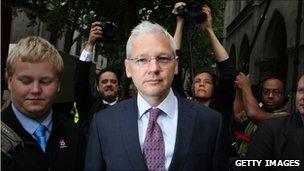Wikileaks' Julian Assange extradition decision deferred
- Published

Julian Assange had argued his extradition would breach his human rights
The High Court has deferred a decision on the appeal of Wikileaks founder Julian Assange against his extradition to Sweden to face sex assault claims.
Judges did not give a date for their decision on Mr Assange's bid to overturn a judgment made in February.
At a two-day hearing, a lawyer for Swedish prosecutors said statements from the two alleged victims showed they did not consent to sex.
Mr Assange's lawyers said the women consented to intercourse.
Mr Assange's appeal had challenged a ruling at Belmarsh Magistrates' Court in February, which said extradition would not breach his human rights.
At that court, District Judge Howard Riddle concluded Mr Assange, an Australian national, would get a fair trial if he was ever charged.
The 40-year-old computer expert is wanted for questioning on three allegations of sexual assault and one of rape, said to have taken place in Stockholm in August last year.
The claims were made by two female Wikileaks supporters.
'Non-consensual'
Clare Montgomery QC, appearing for Swedish prosecutors on the second day of the High Court hearing, said it was "perfectly plain" the women "did not freely consent without coercion".
She said they consented "already having been trapped into a position where they had no choice".
They had "let him continue", said Ms Montgomery.
"This is non-consensual. It is coerced, and the words used - 'I let him' - means non-consent," she told Lord Justice Thomas and Mr Justice Ouseley.
Ms Montgomery said the first woman, named in court as AA, had been a victim of "coercive violent sex" and Mr Assange had "broken a condom".
"Consent had only been given to protected intercourse," she said.
She told the court Mr Assange had raped the second woman, referred to in court as SW, while she was asleep.
Ms Montgomery said the woman may later have agreed to let Mr Assange continue but this did not change the earlier act of rape.
But Ben Emmerson QC said the women had consented and his client would not have been charged with a sexual offence under English law.
"What (Swedish prosecutors) must prove beyond reasonable doubt is that if these circumstances, as alleged, had happened in London, would they have constituted offences?" he said.
'Politically motivated'
Mr Assange said the case was politically motivated, as his website had leaked a mass of sensitive US diplomatic cables.
His lawyers said the claims against him were not extradition offences, and sending him to Sweden would be an abuse of process breaching his human rights.
Mr Emmerson said the arrest warrant was "flawed" as it failed to fairly describe the claims against Mr Assange.
Mr Assange fears extradition to Sweden may lead to him being sent to the US to face separate charges relating to Wikileaks, for which he could face the death penalty.
The Australian won bail in December and has been staying at Ellingham Hall, a 10-bedroom Norfolk farmhouse owned by Vaughan Smith, director of the Frontline media club.
His bail conditions include wearing an electronic tag and daily appearances at a nearby police station.
Supporters had gathered outside the High Court for Mr Assange's arrival and departure.
The judges' decision was reserved and a written judgment will be handed down at a later date.
- Published12 July 2011
- Published16 June 2011